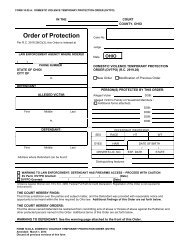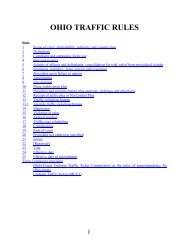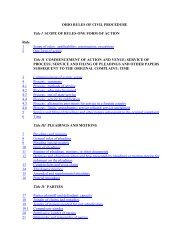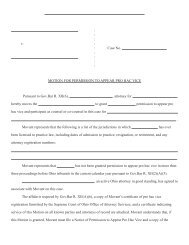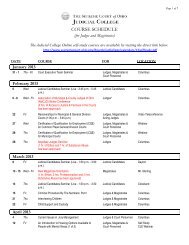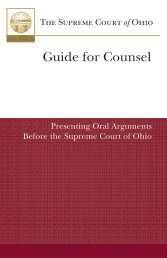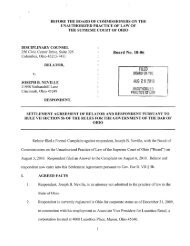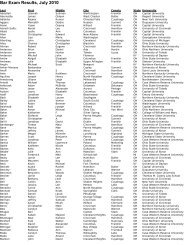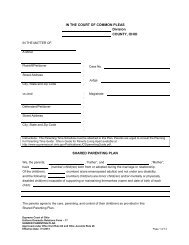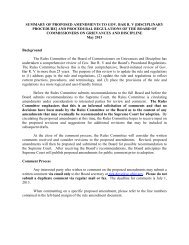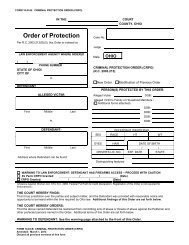disciplinary handbook: volume v - Supreme Court - State of Ohio
disciplinary handbook: volume v - Supreme Court - State of Ohio
disciplinary handbook: volume v - Supreme Court - State of Ohio
You also want an ePaper? Increase the reach of your titles
YUMPU automatically turns print PDFs into web optimized ePapers that Google loves.
McNerney, Akron Bar Assn. v.122 <strong>Ohio</strong> St.3d 40, 2009-<strong>Ohio</strong>-2374. Decided 5/28/2009.Case Summaries- 208Respondent failed to preserve the identity <strong>of</strong> clients‘ funds, failed to keep complete records <strong>of</strong> hisclient trust account, failed to give notice to clients that his malpractice insurance had lapsed, and failed toupdate his attorney registration record. Respondent entered the practice <strong>of</strong> law as a second career afterworking in banking, first for a regulatory agent, then for an accounting firm, and later for a bank. Hemaintained only a single bank account for his law practice from at least January 2006 until at leastSeptember 13, 2007 and he deposited both personal funds and client funds. He never reconciled theaccount, but kept the bank statements, a check book, canceled checks, and copies <strong>of</strong> clients‘ checks todistinguish his personal funds from those <strong>of</strong> his clients. Respondent claimed that before being deposedby relator he had no idea that ethical standards prohibited the use <strong>of</strong> the same bank account forclient funds and personal funds or required the keeping <strong>of</strong> records to document activity in the clientaccount. The Board doubted this pr<strong>of</strong>essed ignorance because <strong>of</strong> his banking experience and becauseafter the deposition he took no steps to open a separate personal bank account, to reconcile the trustaccount, or to inquire about appropriate accounting practices. He simply deposited all his receipts intoone account and then withdrew what he believed he earned. He conceded that he may have withdrawnmoney still belonging to clients from the funds commingled in the solitary bank account, but heexplained that his practice mostly involved small flat fees from criminal-defense cases. And he had onlytwo or three clients whose money he had deposited in that account. Board adopted panel‘s findings <strong>of</strong>violations <strong>of</strong> DR 9-102(A), DR 9-102(B)(3), Pr<strong>of</strong>.Cond.R. 1.15(a), Pr<strong>of</strong>.Cond.R. 1.15(b). Respondent‘smalpractice insurance lapsed from January 2007 until reinstated in May 2007. Board adopted thepanel‘s findings <strong>of</strong> violations <strong>of</strong> DR 1-104(A) and (B) and Pr<strong>of</strong>.Cond.R. 1.4(c) for his failure to notifyclients or obtain the clients‘ signed acknowledgement <strong>of</strong> the lack <strong>of</strong> coverage. At a second depositionby relator in mid-September 2007, relator identified to him that he had not updated his attorneyregistrationrecord in accordance with Gov.Bar R. VI(1)(D). He remained in default until October 23,2007. Board adopted panel‘s findings as to violations <strong>of</strong> DR 1-102(A)(6) and Pr<strong>of</strong>.Cond.R. 8.4(h) forrespondent‘s failure to properly register, together with the misuse <strong>of</strong> the trust account and failure todisclose the lapse <strong>of</strong> malpractice insurance. The Board noted that evidence at the hearing clearly andconvincingly showed the panel that respondent has untreated and unresolved substance abuse and medicalissues that threaten his ability to practice law. His problems with alcohol are longstanding. As acondition for admission to the <strong>Ohio</strong> bar, he was required to participate in alcohol-abuse treatment withOLAP and he did so from 2001-2004. He completed the program successfully, but his alcoholproblems have persisted. He conceded that at the time <strong>of</strong> the 2007 depositions, he had returned todrinking. He has been cited three times for driving under the influence, most recently in 2005. Heproduced a new OLAP contract at the October 8, 2008 hearing. Although the contract was signed byan OLAP representative in July, respondent did not sign and return the OLAP contract until a week beforethe hearing. He testified that he had not spoken to OLAP representatives since July, that he consumedalcohol, but only ―rarely‖ since then, and that he attended two A.A. meetings the week before thehearing. He testified that he had begun treatment with a psychologist, who diagnosed him withdepression, and with two physicians who both prescribed medications for his condition. Panel chair,granted respondent leave to file medical records documenting his mental-health treatment, but he has notdone so. In mitigation, he has no prior discipline. BCGD Proc.Reg.10(B)(2)(a). Due to the lack <strong>of</strong>medical evidence, the Board attributed no mitigating effect to his alcohol dependence and his claimeddepression. BCGD Proc.Reg.10(B)(2)(g)(i) and (ii). In aggravation, he engaged in a pattern <strong>of</strong>misconduct and had not been appropriately responsible during the <strong>disciplinary</strong> process. BCGDProc.Reg.10(B)(1)(c) and (e). Board adopted panel‘s recommended sanction <strong>of</strong> a two-year suspension,with the second stayed upon conditions: that upon completion <strong>of</strong> the one-year suspension, hisreinstatement be subject to the requirements <strong>of</strong> Gov.Bar R. V10(C) through (G) for reinstatement fromindefinite suspension; and that with any petition for reinstatement filed, he provide pro<strong>of</strong> from treatingmedical pr<strong>of</strong>essionals and OLAP that his alcohol and mental-health problems have been resolved, that hehas followed all treatment recommendations , including compliance with his 2008 OLAP contract, and



